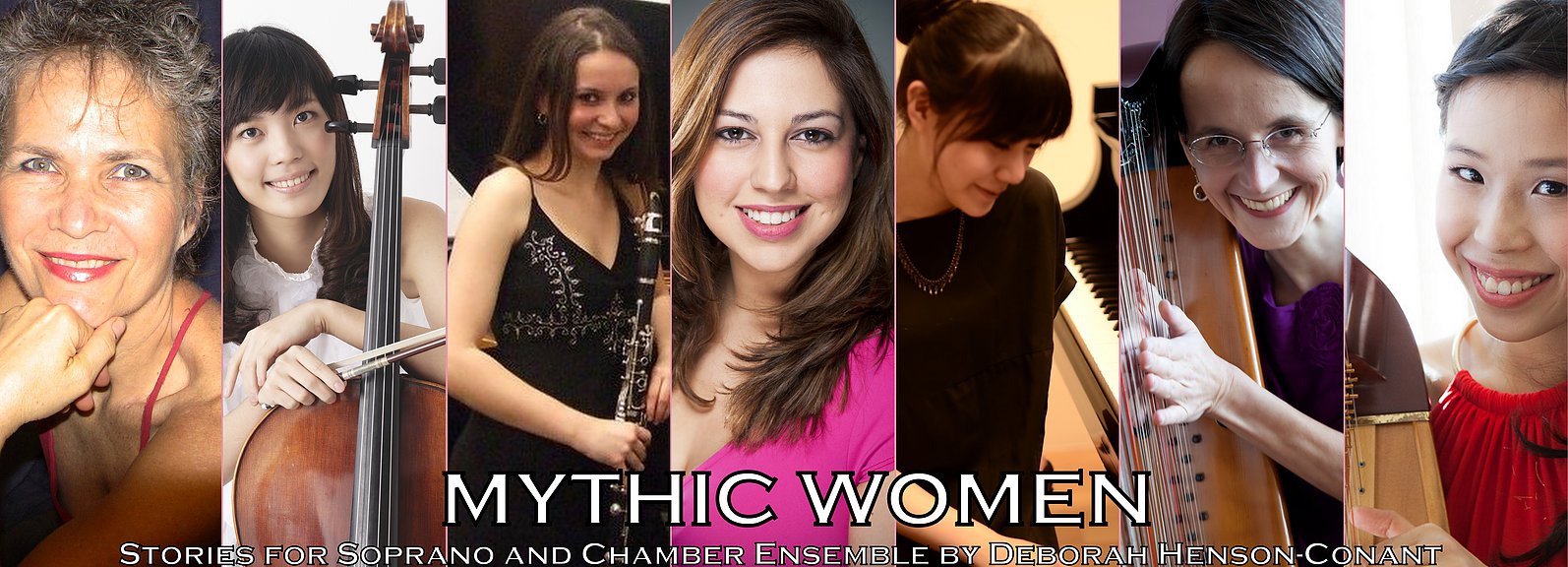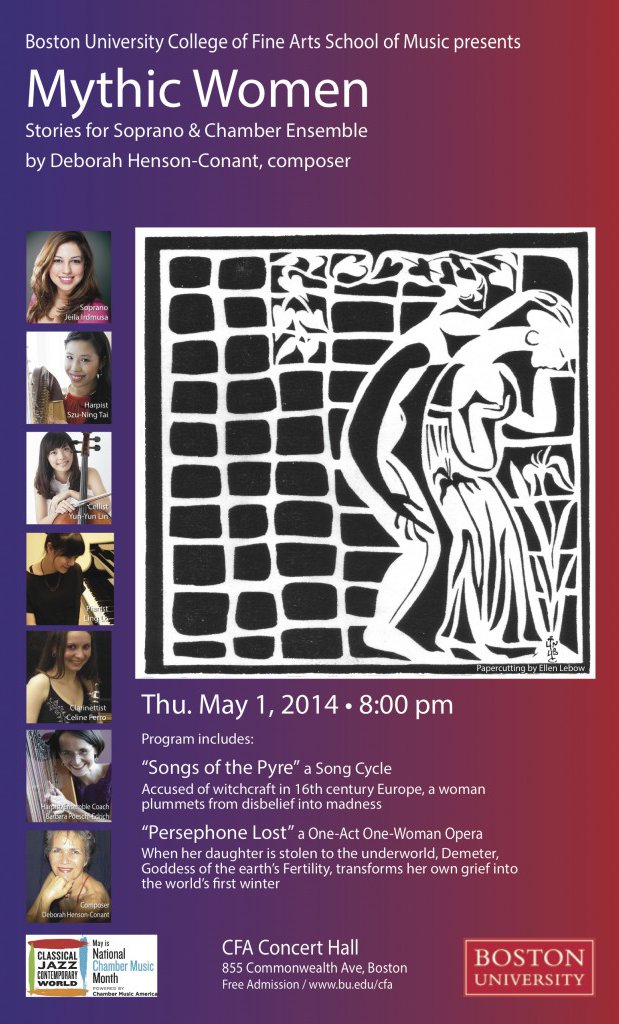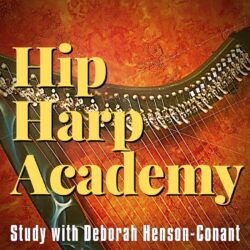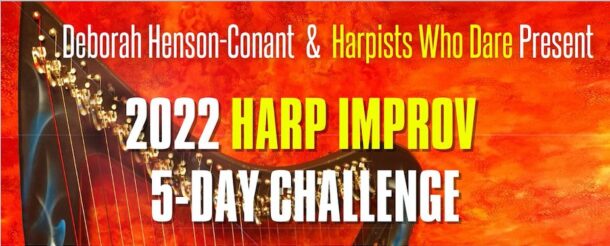
“An extraordinary evening of original chamber works for soprano, harp, cello, piano, and clarinet by composer and world-renowned Grammy-nominated jazz harpist Deborah Henson-Conant.” (Susan Miron, Arts Fuse)
“Mythic Women: Stories for Soprano & Chamber Ensemble” is a concert of two dramatic works of new operatic chamber music for Soprano, Harp, Cello, Clarinet and Piano by Grammy-nominated composer Deborah Henson-Conant.
Both works feature soprano Jeila Irdmusa and instrumentalists from the Boston University, and both are dramatic works of new music about women who hold a place in our mythology.
Originally composed and premiered in 1981, these works were revised and performed in 2014 at Boston University as part of the Chamber Music program.
The two pieces on the program:
-
“Songs of the Pyre” is a song cycle about a woman accused of witchcraft in 16th-Century Europe, who plummets from disbelief into madness.
-
“Persephone Lost” is a One-Woman, One-Act Opera about Demeter, Goddess of the earth’s Fertility, who’s daughter is stolen to the underworld, and as a result, transforms her own grief into the world’s first
Project Mission
Inside iconic stories the human voice can be lost in the myth. We no longer experience these people as ‘real.’ I created the “Mythic Women” project to use story and music to find the human voice in stories of women I’d heard since I was a child. I wanted to know what was the human experience of a woman accused of witchcraft. What was the human experience inside the story of powerful goddess made powerless by the abduction of her child? And what did I need to do to find that humanity? And to share it?
The 2014 Performers
Jeila Irdmusa: Soprano ~ Szu-Ning Tai: Harp ~ Yun-Yun Lin: Cello ~ Celine Ferro: Clarinet ~ Ling Lo: Piano
Composer: Deborah Henson-Conant ~ Ensemble Coach: Barbara Poeschl-Edrich
Watch the full performance: “Songs of the Pyre” below
See program notes, movement notes and lyrics below the video
PROGRAM NOTES - Songs of the Pyre (click to open)
Songs of the Pyre
A Song Cycle in Five Movements
Text and Music by Deborah Henson-Conant
“All wickedness is but little to the wickedness of a woman…
A woman either loves or hates; there is no third grade.
And the tears of a woman are a deception, for they may spring from true grief,
or they may be a snare. When a woman thinks alone, she thinks evil.”
from Malleus Maleficarum (The Hammer of Witchcraft), the major church document that formed the framework for the persecution of witches. Published around 1486.
The Historical Context of “Songs of the Pyre”
It’s become clear, through time, that the persecution of women as “witches” had little to do with the occult, with devil worship or with magic. Most often is was persecution on the level of economics, politics, or social and sexual attitudes – or the accuser’s ignorance, greed, malice, or fear.
It’s been estimated that the number of deaths from conviction of witchcraft equal those of the plague: Nine millions in the 300 years after 1484, the far greater number of the victims being women. During some periods it was unusual for an old woman to die in her bed of natural causes, so prevalent were accusations of witchcraft, especially toward aged women.
Independence, eccentricity, particular beauty or physical deformity, sexual appeal, mental deficiency, age, healing abilities, knowledge, and learning were all reasons for accusations of witchcraft and many women who were accused, convicted, and executed had little or no knowledge of “witchcraft”.
Many, believing their own senses to be inferior to those of their accusers, or of the majority opinion, began to believe that they had unknowingly let the devil into their hearts – by befriending a stray cat, by keeping a pet of any sort, or simply by observing any number of natural occurrences such as a sudden storm or a small whirlwind. Furthermore, as dreams were considered reasonable territory of the devil, any woman who might have a dream, especially an erotic one, in which a man came to her, might well believe that she had been visited by the devil.
The persecution of “witches” never dies, of course. It only takes different shapes. My desire in writing this cycle wasn’t to ask Why or Where, but to explore the emotional, human journey. To ask myself “What would I experience?” and then try to give that human words, and sound and music.
NOTES ABOUT EACH MOVEMENT - Songs of the Pyre (click to open)
I.
This woman, as many, if not most of the women accused, was deeply religious and completely ignorant of her “crimes” until the moment of accusation. As were many women, she is at first incredulous at having been accused and imprisoned and expects the mistake to be found out soon, and the sense of reality is bathed in dreamlike horror.
II.
She speaks of the men who will try her, most often men of the church. She speaks of the accusations themselves. This text is taken from true accounts of accusations involving “spectral evidence”, wherein her “shape” was out at witchery while she, herself, was at chores or asleep.
III.
The use of torture to secure confession was fully accepted both in Europe and in America. One most widely used method was that of the “witch prickers” who offered their services (for a fee) in finding the “witches mark”, the numb spot where the devil suckled on a woman. Women were stripped, often shaved of all body hair, and strapped to a table, stuck repeatedly with sharp knives or pins. When, through exhaustion, they were no longer able to cry out in pain, the witch pricker could triumphantly claim he had found the witches mark.
It was common knowledge that the most likely places to find the witches mark were on the breasts or around the vagina.
Many women preferred suicide or confession and execution to the profound degradation and the horror of this and other tortures, many of which left a woman crippled for life in the rare event that she was acquitted.
IV.
Women, having confessed to crimes, which they did not truly believe they had committed, in order to avoid torture, were consumed with guilt at having falsely sworn their confessions before God. Many reasoned that the ordeal was a test of God’s faith in them and having failed once, by lying, they became desperate to carry out the letter of their confessions: to meet with the devil and to “sign into his book”.
As the devil could supposedly take many guises, any movement, any animal, any sound could be construed to be his coming.
This song is both her confession, itself, and her desire to fulfill the words of the confession.
The last line is a direct quote from an account of the explanation of an accused witch regarding her false confession:
“Her brother urged her to confess, and told her that in so doing she could not lie. To which she answered, “Good brother, do not say so, for I shall lie if I confess, and then who shall answer unto God for my lie?” (from an account dated 1692.)
V.
The occurrence of witches burning in Europe was apparently so commonplace that:
“A Scotch traveler casually mentioned having seen nine women burning together at Bath in 1664.” (from Women, Church and State by Matildy Jose Gage.)
The Hill of Carley is the fictitious hill where this woman is to be burnt along with two other women accused of witchcraft.
Her one escape is madness, and she anticipates the spectacle of her own death in almost childlike gaiety until, in a final moment of lucidity, she sings farewell to her own daughter.
LYRICS - Songs of the Pyre (click to open)
Songs of the Pyre
Text and Music by Deborah Henson-Conant
I
What is this dream: child’s play?
What is this dream?
Is it that: Simply a dream,
Only a dream, merely a dream, simply a dream?
Is it a dream?
Morning will come to break the dream, won’t it?
Night will have done and take the dark, won’t it?
Then we will wake! Then we will dance, won’t we?
Won’t we?
Morning will come, morning will come.
Soon we’ll see the dawn. Then we’ll dance and sing.
All alone in this cell, it must be fantasy.
As in a dream, I feel my arms are shackled to the wall.
Dark and dank and cold it is, as in a nightmare.
Can I wake? I try, and yet I cannot wake.
I try, and yet I still must wait, as in a nightmare,
And be calm, and repeat, and believe:
Morning will come to break the dream.
Night will have done and take the dark.
Then we will wake. Then we will sing. Then we will dance.
Won’t we?!
II
These men are madmen. What do they know of me?
Why do they ply me with their lies!
They all are madmen. What do they know of who I am?
These men are blind men; they see not what they do.
Yet they are wild men, they swear they’ll find the crime.
Tell me how am I to blame! Tell me what could be my shame!
Tell me what my crime is! Can you tell me how I’ve sinned? Oh, tell me:
How will I have flown with the devil last night when I was in my bed?
How will I have sat upon the mast of a ship while baking my bread?
How will I have murdered soldiers in the field when I was at my wheel?
And how will I have poisoned seven children sitting down to eat my Sabbath meal?
These men revile me and yet they’ll try me.
They’ll rob me of my very soul.
These men will kill me, and in the name of God!
They say my soul is taken, they say I am forsaken,
And yet I know these men are Mad!
III
Oh, that I were the Devil’s bride and oh, that I could fly.
I’d fly across the windy hills. Forever I would ride.
They break your bones with wooden sticks; they prick your flesh with knives.
I would rather my soul to Hell might fly than to writhe before their eyes.
I would rather my soul to Hell might fly than to writhe before their eyes.
Oh that I were the Devil’s bride and oh, that I could fly.
I’d fly across the windy hills. Forever I would ride.
IV
In still of night he came to me:
Lit upon my breast as a feather ‘lights upon the snow.
Softly, softly
In still of night he came to me
As a whisper in the dark,
As a cricket on the hearth
At last you’ve come! Come to me now! Come to me now!
In still of night he came to me
As a thrush through the willows
As a rush of wind
As a flutter of leaves
At last you’ve come
Ah, at last you’ve come
You have not forsaken me
At last, at last, you come to me
Hand me the book! Let me sign it!
Give me the quill Quick!
Where is the book? Hand it to me now!
Hush! Hush!
Hear the steps in the hallway
Quick! Quick
Where is the page I cannot see it.
Do not let me die with this lie upon my Soul
Oh no, oh no, oh No!
Hand me the book
Let me sign it
Or who will answer unto God for my lie
V
As I was passin’ the hill of Carley for to see what was flamin’ there,
I spied three ladies a-burnin’ burnin’ burnin’ in the summer air.
Tra-la-la la la la la la la. Tra-la-la la la lay.
Tra-la-la-la la la la la la. Tra-la-la la-la-la lay.
I spied three ladies a-burnin’ burnin’ burnin’ in the summer air.
Tra-la-la la la la la la la. Tra-la-la la la lay.
Tra-la-la-la la la la la la. Tra-la-la la-la-la lay.
I saw three ladies a-burnin’ burnin’ burnin’ all on a summer’s day.
The flames were high on the hill of Carley. Oh, the flames they were dancin’ fair.
Dancin’ high on the hill of Carley, dancin’ high in the summer’s air.
Tra-la-la la la la la la la. Tra-la-la la la lay.
Tra-la-la-la la la la la la. Tra-la-la la-la-la lay.
Dancin’ high in the summer’s air.
Tra-la-la-la la la la la la,
Tra-la-la la la la la la la. Tra-la-la la la lay.
Tra-la-la-la la la la la la. Tra-la-la la-la-la lay.
As I was passin’ the hill of Carley for to see what was flamin’ there,
I spied three ladies a-burnin’ burnin’ burnin’ in the summer air,
Burnin’ in the summer air, burnin’ on a summer’s day,
On a summer’s day.
Fare thee well my darlin’, darlin’ fare thee well.
I’m off to seek my fortune in the bonniest room of Hell,
The bonniest room of Hell.
Watch the full performance: “Persephone Lost” below
See program notes, movement notes and lyrics below the video
PROGRAM NOTES - "Persephone Lost" (click to open)
Persephone Lost
A One-Woman One-Act Opera
Text and Music by Deborah Henson-Conant
PERSEPHONE LOST is based on the classic myth of Demeter and her daughter Persephone (also called Proserpine and Kore, “the maiden’). Demeter was the Goddess of the harvest, in some ways the original “mother earth.” Some say the second part of her name “meter” comes from the Proto-Indo-European word for “Mother.”
In the classic myth, Hades, King of the Underworld, abducts Demeter’s virgin daughter, Persephone by entrancing her with an unearthly narcissus flower and then carrying her to the underworld on his steed.
“Persephone Lost” begins as Demeter first calls out to her daughter, finds the fallen flower – and then hears the echo of hoofbeats. Realizing her daughter is missing, Demeter begs each living thing to tell her what happened, but all life, fearful of Hades, answers with silence. Demeter interprets the silence as guilt, and punishes the world by bringing eternal winter.
And in this icy, barren plain, she continues to search until at last the Dark Side of the Moon takes pity on her and takes her to speak to Helios, the sun. It’s Helios that tells her the story – and at the end of “Persphone Lost” Demeter, knowing her child is in the underworld, sings a kind of lullaby, embracing her love of her daughter, even if she can no longer truly embrace her.
I wrote PERSEPHONE LOST thinking of my mother, and the inevitable loss – real or figurative, that comes every motherhood. But I was also hearing stories, when I wrote it of mothers in Central America whose children had suddenly “disappeared.” Their anger, pain and sense of powerlessness overwhelmed me. The silence of those who “knew,” their inability to help, for fear of their own lives: these thoughts and these women were in my mind constantly while I was writing PERSEPHONE LOST.
In the classic myth, Persephone returns to the earth each year – and her journey between underworld and outerworld explain the seasons. But in real life it’s not always so there’s not always a return. The loss is final.
I didn’t write this piece to tell the ‘real’ story of Demeter – but for Demeter to tell the emotional story of real loss. This story ends with loss. Demeter’s triumph is her ability to embrace joy within that moment of loss.
LYRICS - "Persephone Lost" (click to open)
PERSEPHONE LOST (Text)
(Note: Persephone has many names, among them are Proserpine and Kore, meaning “the maiden”)
I.
Proserpine, Kore, Proserpine!
Come from your hiding, come from your games, come to my arms my joy!
Proserpine my only, Proserpine my gem, Proserpine my child!
Look, you clumsy little maid: such a lovely blossom have you dropped. Kore, Kore, Kore …
Hoofbeats! Thunder! Korel Kore! Ahl
Hmm — Proserpine, Kore, Proserpine…
II.
Springtime still! Where is the hush? Where is the whispering chill?
The sudden, silent stroke that tells of Paradise undone?
Sunlight still! Where is the gathering dusk? The crack of flame, the dark, devouring sweep of rain?
Why is there sweet perfume? How can the lilac bloom?
How can the breeze race? How can the river turn? How can the heartless blackbird dare to sing?
Oh, faithless blackbird, dare you pierce my sorrow with your song?
III.
How does the spring dare to be spring when I have lost my Kore?
How does the vine dare to bloom when the only blossom has been plucked from my side?
How does the spring dare to be spring?
How does the crow dare to fly when my flight is gone?
How can the spring dare to be spring when I have lost my Kore?
How may the golden pear still cling to the skirts of her crusted limb as my Kore clung to me?
How may the lark still sing her gladsome song to the dawning sky as my Kore sang to me?
How may the giddy, blushing breeze step laughing from the ether to run through the blooming meadow as my Kore ran to me?
How may the earth still hold the curving shoulders of each slumbiring rock as I held my Kore in my arms?
How may the spring dare to be spring when I have lost my child?
IV.
Ye of this earth, hear my sorrow! Is there not one who knows where my only joy is taken?
Pray, will you only pity me?
Tell me: where is she? Where is she? Where have you taken my child?
Did you see my child? Did you see her dancing in the meadow?
Did you see my child? Did you hear her cry?
Someone must have seen! Someone must have heard!
You!
Did you see my child? Did you see her dancing in the meadow?
Did you see my child? Did you hear her cry?
Someone must have seen! Someone must have heard!
You! Did you see my child?
V.
You must have seen my Kore, she was playing by the river here! …Silence.
You must have heard something …Silence
My little girl is lost! …Silence
You! Why do you tremble? Why?
Why do you cower from me? Who do you fear?
Why do you cower from me? Who do you fear?
Why do you cower from me? Who do you fear?
Silence! Silence! Silence!
- •
VI.
Oh, my beloved earth! You profess your guilt with silence.
You seal your fate with silence. Oh, my beloved earth.
As you may wish, keep your silence, you who forsake my joy.
Where my tender heart is frozen, so shall you heart be frozen too, I decree!
Come darkness, come night and frozen rain! Come wind and cold and misty shadow!
Bite and chill and vapour and twilight and ice! Come!
VII.
So, throughout nine days over land and sea I travelled,
Through the icy barren plains, and over frozen waters.
Never did I eat, nor never did I drink nor sleep nor bathe, so bitter was my sorrow.
Yet, when upon me there came for the tenth time glimmering morning,
I was met by the Dark Side of the Moon who spoke to me of my daughter saying:
“I have heard the voice of your child, though I beheld her not.
Come with me to him who is the watcher. He shall have seen your Kore.”
VIII.
So to Helios we travelled and I did appeal saying:
Helios, glorious, radiant Helios!
You who gaze watchfully downward.
Tell me truly if perchance you see my child.
Tell me who, among men or gods, has stolen her unwilling. Speak!
[Helios speaks:]
I have seen! Ah yes, I have seen your child.
As she played with violet and rose and crocus tangled in her hair.
Thus she played by the riverside, happy and free.
When there bloomed bright a thousand-petalled narcissus by the riverside.
Ah, how she laughed in wonder at the dazzling plaything!
Ah, how she stretched her arms to the blossoming jewel!
When, as she stood thus, enraptured in fragrance and beauty,
The verdant earth trembled beneath her feet,
And yawning black in the Nysian plain, spewed forth from the darkness: five steeds as dark as the darkness!
And rising in thunder and flames, the King of Darkness, in his flaming chariot,
Galloped forth from the renting earth and plucked the child, frozen in fear,
Plucked her from the earth!
Down, down he galloped in a peal of thunder!
Down, down, down with your Kore!
Down to darkness and dankness,
And down, down, down with your child to Hell!
Thus I have seen and swear to you I alone have seen this deed!
IX.
[Demeter]
Then I have wronged you my earth. It is those far more powerful than you who have stolen my child
How dare they call themselves gods, who stole her! Are such cruel deeds godly? Then, as I am myself
a god, I shall have no part of this! Let such depravity be divine, then! Let it be divine!
For my part, I shall be mortal. Oh, let me be mortal!
X.
Here in this field, as twilight blinks upon the far hills, I feel my Kore near.
Here, as the glistening dew winks to the blossoming starlit night, I feel the warmth of her breath,
I smell her hair, I hear the rustle of her feet behind me!
Kore, Kore, Kore, Ah!
Oh, that you knew how I call your name!
Oh, that you could hear. And yet perchance you do.
When you are far away, can you hear me?
And if I called you softly, would you appear? Kore Kore.
Though you are far away, you are near me.
Promise you’ll carry me with you ‘til I carry you home again my Kore, Kore!
Kore, I will bring you:
Home to my arms again.
Safe beside me, stay beside me!
‘Til you are near me, Kore, Kore, Kore:
All I have, I give, to hold my child again!
To hear her laughter here in my heart.
Come to my arms my joy!
From the Press
“An extraordinary evening of original chamber works for soprano, harp, cello, piano, and clarinet by composer and world-renowned Grammy-nominated jazz harpist Deborah Henson-Conant.”
ArtsFuse writer Susan Miron wrote this description of the project:
“Thirty years ago, [Deborah Henson-Conant] wrote a one-woman “opera” for her aunt [soprano Gloria Hodes.] Henson-Conant was, she recalls, looking for her place in the world as a woman. The cliché that a witch was one way in which a woman could be powerful intrigued her, so she investigated the matter through a one-woman opera for which she wrote the music and lyrics, Songs of the Pyre. The composition was for operatic soprano, cello, harp, and piano. The second opera was about a goddess, Persephone Lost. She chose these stories because, she says, “I needed to understand what was inside them.”
The two pieces were premiered in the ’80s, and then sat in a box. Then, in 2012 were digitally transcribed from the handwritten scores in 2012. Good timing, indeed. At Boston University, harpist Barbara Poeschl-Edrich invited Deborah to collaborate in a concert featuring the works, and the results, coached mostly by Poeschl-Edrich, were on stage at CFA Concert Hall on May 1.
The performances were excellent, and the soprano, Jeila Irdmusa, was riveting. The other polished players were Szu-Ning Tai, harp; Yun-Yun Lin, cello, Ling Lo, piano, and Celine Ferro, clarinet.
In Songs of the Pyre, Henson-Conant reflects chillingly on the question, ‘What would she have experienced?’ if she was condemned to death because of accusations of witchcraft? The church document The Hammer of Witchcraft was published around 1486. Three hundred years later, some nine million people have been put to death after they were convicted of being witches. “The persecution of witches never dies,” Henson-Conant pointed out. The music is adroitly attuned to The Songs of a Pyre‘s dramatic and scary narrative, which introduces us to a woman, deeply religious and oblivious of her “crimes,” the horrific accusations of witchcraft, her torture, her acceptance that she should ‘confess’ to her crimes, and her final escape into madness.
The second composition was the one-woman, one-act opera Persephone Lost, with text and music by Henson-Conant, based on the Greek myth of Demeter and her daughter Persephone, who was abducted by Hades, King of the Underworld. “My intention in writing this piece,” Henson-Conant recalls, “wasn’t to tell the ‘real’ story of Demeter – but for Demeter to relate the emotional story of her very real loss…
In the classic myth, Persephone returns to the earth each year. Her journey between underworld and outerworld explains the seasons. But in real life it’s not always so… there’s not always a return. The loss is final.” The “desaparecidos” (the disappeared) children in Central and South Amercia were on Henson-Conant’s mind when she created the piece. The music is wonderful, with lovely clarinet licks and some beautiful harp and cello writing. The lyrics, sung powerfully by Jeila Irdmusa, were as affecting as the music.
The fascinating thing about experiencing these two operas, or duo of musical-theater pieces, is hearing where Henson-Conant was musically (and emotionally) in the early ’80s. I loved these two operas, and look forward to hearing them on YouTube. The texts are sophisticated, clever, and emotionally satisfying. Do the compositions deserve to be heard more often? The answer is yes, and hopefully with this ensemble, coached so well by Barbara Poeschl-Edrich.”




